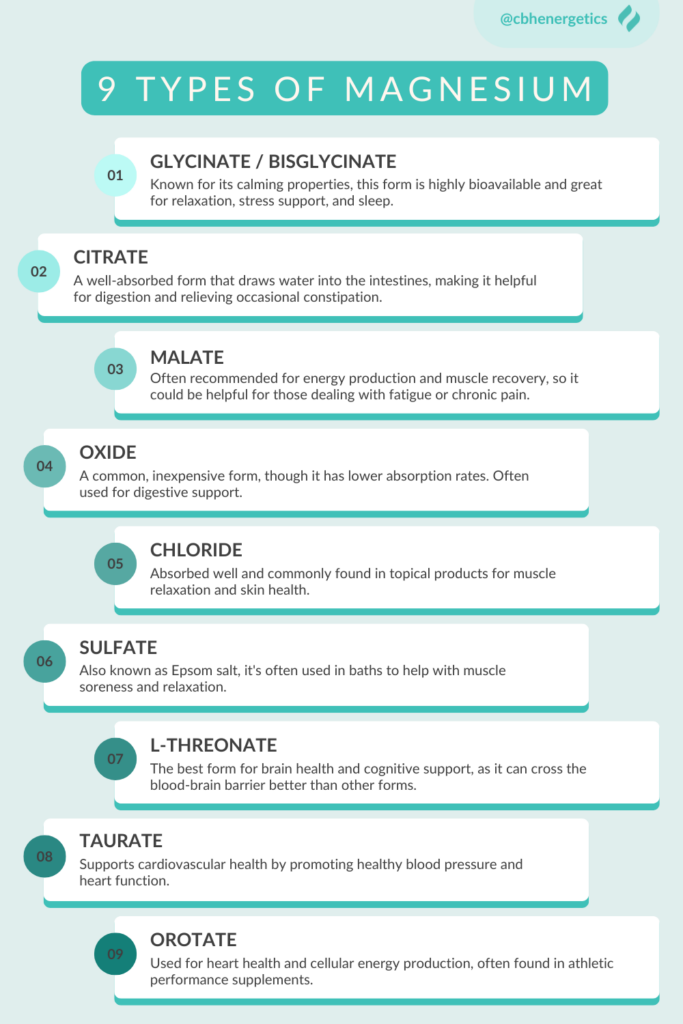
Is Your Body Sending You Signals of a Magnesium Imbalance?
Do you often feel fatigued, struggle with muscle cramps, or notice that your mood seems to be fluctuating more than usual? These could be signs of a magnesium imbalance, affecting far more people than you might think.
In fact, research shows that nearly half of the U.S. population isn’t getting enough from their diet. That means millions of people may miss out on magnesium’s benefits, from muscle function to stress support.
There are a few reasons you may not be getting enough magnesium into your body, and we will cover that in this blog! It’s not so easy to get enough magnesium from food alone, so we’ll explore the different types of magnesium supplements and what they actually do in the body. By the end, you’ll clearly understand how to support your magnesium levels and why this mineral deserves a ton of attention.
What Is Magnesium, and Why Does It Matter?
Magnesium is the 4th most abundant mineral in our bodies, found in high concentrations in our bones, hearts, muscles, nerves, and cells. It’s involved in over 300 biochemical reactions, and without enough, the body struggles to keep up with daily demands, which can lead to a magnesium imbalance. It’s so important that vital organs like the brain and heart can’t function properly without it.
Here are just a few of the roles it plays:
-
- Muscle Function – helps muscles contract and relax properly, preventing cramps and tension.
- Nervous System Support – keeps nerve signals balanced, helping with focus, stress response, and mood balance.
- Heart & Blood Pressure Regulation – supports heart rhythm and circulation.
- Bone & Joint Health – works alongside calcium and Vitamin D to build strong bones and prevent mineral loss. Supports cartilage and joint function.
- Glucose & Metabolic Balance – plays a role in insulin function and blood sugar regulation.
- Digestive Health – supports proper enzyme function for digestion, promotes bowel regularity, and helps prevent constipation.

Why Are So Many People Low in Magnesium?
Unfortunately, your body doesn’t produce magnesium on its own. That means it has to come from food or supplementation. You’d think getting enough magnesium would be simple, but modern life makes it surprisingly tricky.
Even if you eat magnesium-rich foods like leafy greens, nuts, seeds, and whole grains, you may still come up short. Here’s why:
Soil Depletion – Today’s soil contains less magnesium than it did decades ago. Even a balanced diet may not provide enough.
Food Processing – Many processed and refined foods, like white bread or sugary snacks, lack the same amount of magnesium found in whole foods.
Absorption Issues – Gut health plays a huge role in magnesium uptake, so if digestion is compromised (due to stress, medications, or imbalances), your body may struggle to get enough. Age is also a factor; we lose stomach acid as we age.
Magnesium Loss – The body easily loses magnesium due to stress, caffeine, alcohol, and medications like diuretics or antacids.
What Happens When Magnesium Levels Are Low?
Magnesium imbalance can manifest in many ways because it affects multiple systems in the body. Some of the most common signs include:
- Muscle cramps, twitching, tension, or restless legs
- Fatigue, poor sleep, or frequent waking at night
- Increased anxiety, mood swings, or trouble relaxing
- Irregular heartbeat or high blood pressure
- Constipation or slow digestion
- PMS & menstrual cramps

There are so many things magnesium is connected to!
Here are some other surprising ways a magnesium imbalance may contribute to:
➡️ ADHD & focus issues: Magnesium helps regulate neurotransmitters like dopamine and serotonin, both of which are essential for focus and impulse control. Low levels have been linked to hyperactivity. Without enough magnesium, staying on track can feel like a challenge.
➡️ Cognitive decline: Magnesium supports brain health as we age. Magnesium levels are found to be reduced in people with Alzheimer’s.
➡️ Sensitivity to loud noises: Magnesium plays a key role in calming the Nervous System, and a deficiency may make you more sensitive to loud noises. When magnesium levels are low, nerves can fire too easily, making everyday sounds—like a honking horn or a buzzing blender—feel more intense or jarring.
How Do You Test for a Magnesium Imbalance?
Magnesium is primarily stored in bones and tissues, so a blood serum test may not provide the complete picture.
Using hair and saliva, bioenergetic testing evaluates the body’s energy systems and how they interact with magnesium on an energetic level. This type of testing can offer a more holistic view by identifying energetic stress patterns related to magnesium. It can also energetically identify the synergistic minerals that help magnesium work better, such as calcium, Vitamin D, zinc and Vitamin B6.
How to Increase Magnesium Absorption
With less magnesium in our food and a high depletion rate, supplementation has become one of the most effective ways to maintain healthy levels.
However, you can’t supplement pure magnesium. Because it’s a highly reactive mineral with a positive charge, it must be bound to a negatively charged molecule to remain stable. This binding process affects how well the body absorbs and utilizes different kinds of magnesium.
That’s why magnesium supplements come in various forms—each type is paired with a different molecule that impacts absorption, bioavailability, and how it functions in the body. Some types are better for digestion, while others target brain health, muscle recovery, or stress support.
Because magnesium supplements pose little risk of toxicity for most people, many healthcare professionals recommend regular supplementation to prevent deficiency.
Let’s look at all of the different kinds of magnesium!

Which Magnesium is Best for You?
Because magnesium affects so many body functions, no single type is best for everyone! It doesn’t mean that you need to buy 9 different types of magnesium supplements, but while each type is often associated with a primary benefit, most forms support multiple areas of health. For example, magnesium bisglycinate is great for relaxation, but it may also help with muscle recovery and digestion. Magnesium taurate is best known for heart health but still offers nervous system support.
A magnesium imbalance can impact energy, digestion, brain function, heart health, and more. Our modern diets and stress make deficiency common. By understanding the different kinds of magnesium, you get to know which ones may be right for you!
And if you’re unsure where to start, a CBH Energetics bioenergetic scan can help identify areas where magnesium may be affecting your health.
